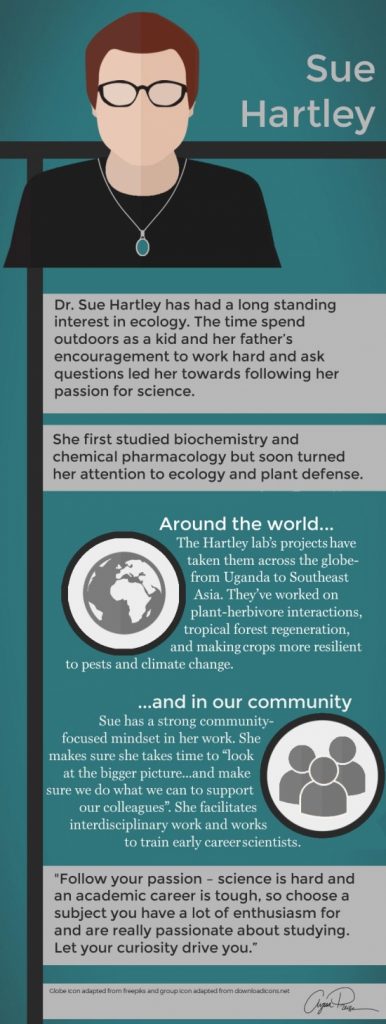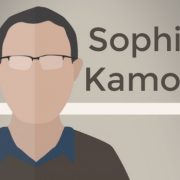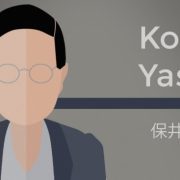Plant Scientist Highlight: Sue Hartley
A series by Alyssa Preiser
 Why did you decide to pursue science as you went through college, and what got you particularly interested in plant defense and plant/organism interactions?
Why did you decide to pursue science as you went through college, and what got you particularly interested in plant defense and plant/organism interactions?
I was always interested in science. It started as a young kid when I used to collect natural history – animal skulls, feathers, interesting pebbles, tree bark and all sorts of stuff (much to my mother’s horror!). I can remember being interested, even before I went to University, in why the natural environment looked the way it did – why did some plants grow here but not there? Later on I wondered about a career in medical research so I studied Biochemistry and Chemical Pharmacology at the University of Oxford, but my love of plants reasserted itself and I decided to look for an ecological subject where my chemical knowledge would be useful. Plant defense against herbivores was perfect – all those amazing chemicals plants produce to help them win the battle against their natural enemies! I was hooked and went to the University of York to do a PhD on plant defense and I’ve been interested in it ever since.
What values did you learn growing up that you carry into your work today?
I spent a lot of time outdoors when I was growing up and developed a love of the natural world, particularly plants, and I always wanted to know more about how nature worked – how did different plants interact with each other and with other species, how did they survive in harsh environments? My father is an academic (long retired!) and he encouraged me to work hard, to ask questions, to read and to learn. He gave me the confidence to follow my passion for science.
What are some examples of some unexpected hurdles and how did you overcome them?
One of the first things you learn in scientific research is that things often don’t turn out how you expect! During my PhD I can remember spending many frustrating weeks trying to get a new method for measuring the induction of plant defenses to work – but I can also still remember the great feeling when I finally succeeded! Learning how to stay enthusiastic in the face of setbacks is a useful skill in science!
What do you hope to be remembered for in 100 years?
I’d like to be remembered as someone who did some interesting research in plant-herbivore interactions, but more importantly as someone who gave something back to the ecological community by supporting and training early career scientists and in my roles as a trustee of Royal Botanic Gardens Kew, a President of the British Ecological Society and so on. In science it’s very easy to get focussed on your own lab and research but we need to look at the bigger picture too and make sure we do what we can to support our colleagues. To solve the big issues of the day – climate change, food insecurity, biodiversity loss, – we need to work together and across disciplines and I’d like to be remembered as someone who facilitated that interdisciplinary and collegiate approach, for example through my work as Director of the York Environmental Sustainability Institute.
You’ve been working on geographically diverse projects- the Sinai desert, Borneo, Uganda, and the Greater Mekong Subregion- can you briefly tell us about your work in these areas and what got you interested tackling research in such a wide range of places?
A lot of these opportunities came about through colleagues asking me to be involved in research in these projects because there was a need for work on plant-herbivore interactions. One of the wonderful things about a career in plant science is the chance to visit amazing places and study the plants there. The other really inspiring thing is a lot of these projects involved helping to conserve biodiversity, either by training the next generation of plant ecologists in Uganda or by understanding more about the process involved in tropical forest regeneration in Borneo. I’ve also had the chance work on projects aiming to support farmers in Kenya and in SE Asia by making crops more resilient to pests and climate change which has been another privilege.
Starting new projects, challenging current thinking and paradigms, pioneering new techniques takes a lot of creativity. Where do you find inspiration to tackle these new challenges?
I think I get my inspiration from two sources. One is the natural world – it is so amazing and I’m still passionate about understanding it better and using that understanding for the good of humanity, whether by conserving biodiversity for future generations or by using natural methods of plant defense for more sustainable agriculture. My second source of inspiration is my colleagues – I’ve worked with some really inspiring people over the years, starting with my PhD supervisor, Prof Sir John Lawton, who got me started on this wonderful journey into plant ecology.
Do you have a memorable quote that has stuck with you?
I think it can be easy to get depressed about the state of the world – climate change, environmental destruction and biodiversity loss, but I’m by nature an optimistic person and I have great faith our capacity for innovation and discovery. So I like a quote from Mahatma Gandhi that reminds me that if we want things to get better we need to play our part: “Be the change that you wish to see in the world”.
What is one piece of advice for early-career scientists that you would like to pass on?
Follow your passion – science is hard and an academic career is tough, so choose a subject you have a lot of enthusiasm for and are really passionate about studying. Let your curiosity drive you. That is one piece of advice and a second is don’t give up! You will have lots of difficulties and things that go wrong – papers rejected, grants failing – but when you discover something new, particularly something which could help, for example, improve crop resistance to pests or drought, you’ll realize there is no better way to spend your time!
Download a copy SueHartley








